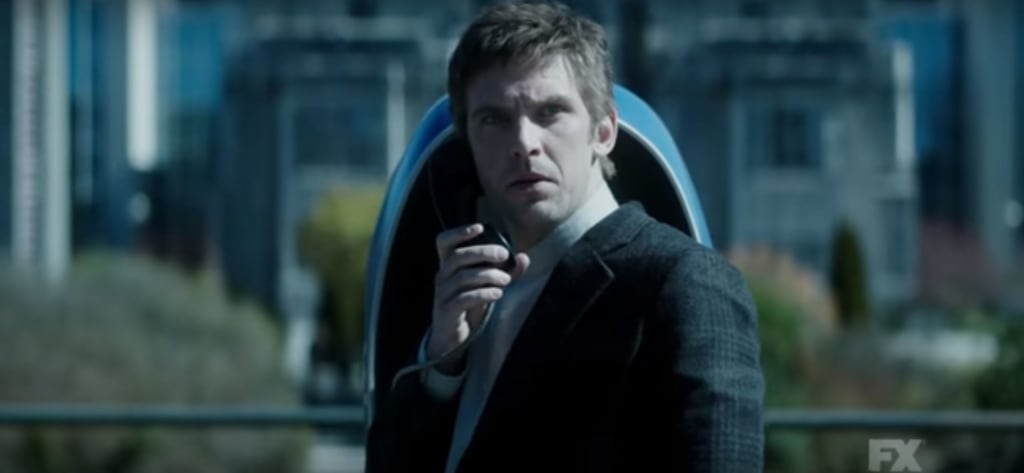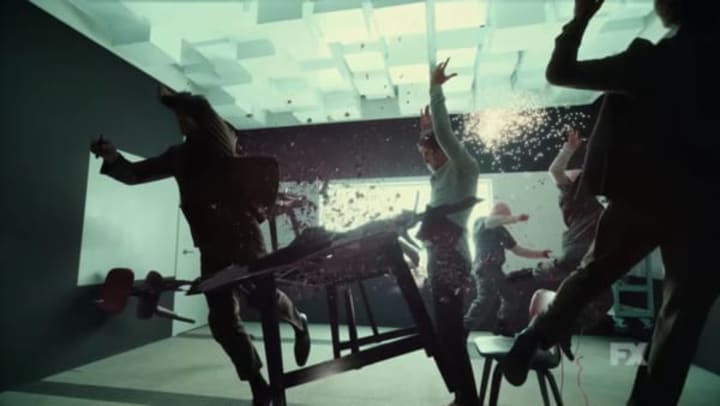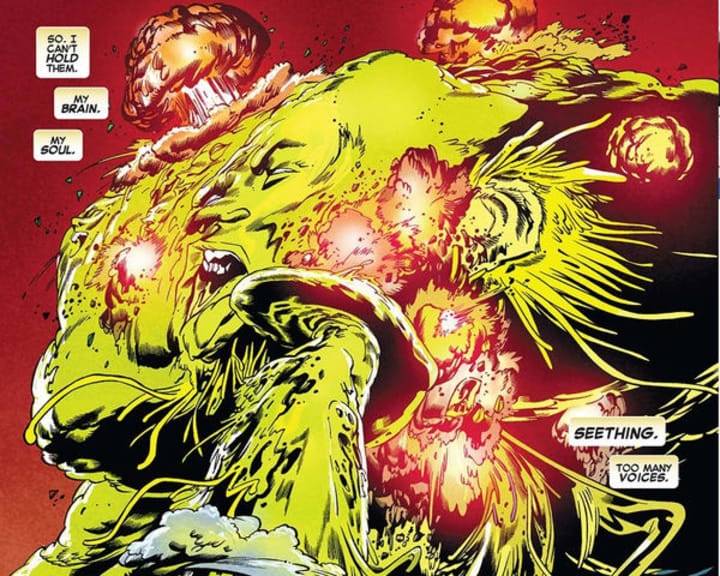
It's like waiting for a bus. You've been stood at the stop for an hour, wondering when the bus will arrive, and then two turn up at once!
#Split and Legion are like that; although one's a movie and the other's a TV series, both are semi-superhero narratives inspired by Dissociative Identity Disorder (DID): the phenomenon that used to be called Multiple Personality Disorder. One stars the phenomenal #JamesMcAvoy as Dennis, while the other features #DanStevens as David Haller. Both hint that the central character's experience of DID may not actually be some sort of psychological disorder - it may actually be a power of some kind.
But for all of Legion and Split's similarities, they also have very real differences. Let's compare and contrast, and see why these two buses aren't as alike as they seem at first glance!
Inside the Mind

James McAvoy in 'Split'. [Credit: Universal Pictures]
Before we begin the compare-and-contrast, let's establish some ground-rules; a person with Dissociative Identity Disorder has a number of personalities, known as 'alters'. One personality is usually dominant, and is known as the 'host'; but in reality, even the host is experienced as just another alter. Alters can be aware of one another, and can be friends, brothers, enemies — even lovers. The goal with most treatments is to encourage co-operation between the alters, because these alters will work together best as a team. It's quite dangerous and damaging to 'lock up' any alter, or to encouraging wresting control away by force.
In the case of Split, the alters are completely aware of one another. At the times they're not in control, they seem to experience reality as a sort of 'waiting room', where they can meet, discuss, and even conspire against one another. Significantly, though, when some alters are in control they can do things the others aren't aware of — such as send emails.
For David Haller in Legion, the situation is far more bewildering. Legion explores the experience of one of the alters — possibly the host alter, possibly not. Worse still, he has absolutely no idea what he's dealing with. It's distinctly possible that Clockwork Hospital doesn't actually exist; that the hospital is the Legion equivalent of the 'waiting room', and that every one of the inmates was actually an alter. By the end of the first episode, it's simply impossible to tell what's real and what isn't.

A telekinetic strop. [Credit: FX]
Even at the end of the episode, when David is recovered by a small band of mutants and goes on the run, reality is questionable. A number of major characters in those scenes fit standard alter types, most notably the protector and the persecutor (the mutants who 'save' David, and the anti-mutant paramilitary forces, respectively). Don't take anything as read.
Now, curiously enough, for all David Haller demonstrates DID in the comics, mental health professionals aren't sure that's where this series is going. My fellow Creator S. C. O'Donnell observed that the pilot seemed to show something akin to Schizoaffective Disorder, which can cause dissociation - but David himself is always interacting with the people in his mind, i.e. experiencing hallucinations, delusions, and mood shifts. We don't actually see evidence of his mind splintering. It's possible that this may change as the series goes on, but so far it's actually blurred the lines between DID and Schizoaffective Disorder in a way that isn't particularly helpful.
This, then, is the fundamental difference between Split and Legion. In Split, we are the outsider looking on, watching James McAvoy portray a range of different alters. In Legion, in theory we're sharing David's experience, on the inside looking out. Ironically, though, the portrayal seems fairly inaccurate, and it's possible that Noah Hawley's series is actually focusing on Schizoaffective Disorder rather than DID.
In Split, DID is discussed as an ability in and of itself; Betty Buckley's Doctor Fletcher points to physiological changes when alters take control. Surprisingly, these changes do indeed happen; there really have been cases of DID where one alter was allergic to orange juice, for example, and another was not. When one alter controlled the body, it manifested the allergy; when the other controlled it, the body was no longer allergic. There really is evidence that physical changes can be associated with the different alters.
Of course, Split takes this to the next stage; it features the central character developing a new protector alter, the Beast, who is believed to possess phenomenal strength, agility, and resistance to injury. Many of the Beast's attributes are developed from the zoo environment in which Dennis works, and by the end of the film, the Beast itself seems to have become the new host — the dominant personality, taking control for most of the time.

You better run from the Beast! [Credit: Universal Pictures]
In Split, then, your beliefs shape reality. The Beast personality is believed to have certain attributes, and thus the body develops them when the Beast is in control. It's a haunting idea, and suggests that people with DID have unlocked the power of the mind in a way that the rest of the world simply can't imagine.
In contrast, over in Legion David Haller is a mutant; a subtle difference in his genetic structure means that he possesses vast power. The relationship between David's powers and in the comics his experience of DID has always been complex, with Simon Spurrier's X-Men: Legacy run teasing it out the most.

In David's mind. [Credit: Marvel Comics]
Realistically, it's far too soon to say what Legion's take is going to be; there are hints that David is wrong to believe himself "crazy", that in reality everything he's experiencing is a manifestation of his mutant powers, generating as some form of Dissociative Identity Disorder or, more likely, Schizoaffective Disorder. We certainly see him manifest telekinesis, but in the comics that's just one of his most basic abilities. As I've mentioned, it's distinctly possible that even the 'mutant resistance' group who rescue him at the end are just alters, co-operating to save him. If that's the case, then we saw telekinesis used far more effectively, but also saw pyrokinesis — another power traditionally associated with the character.
As you can see, while Legion and Split strike many of the same notes — they both deal with major psychological conditions, they both relate the phenomenon to superhuman abilities — they're also very different. At the heart of that difference is simply the matter of perspective; one looks at DID through the eyes of an outsider, whereas the other dives deep into the experience, dizzying us with questions about the nature of reality. As Legion continues, I have no doubt that divergence will only grow.
About the Creator
Tom Bacon
A prolific writer and film fan, Tom has a deep love of the superhero genre.






Comments
There are no comments for this story
Be the first to respond and start the conversation.